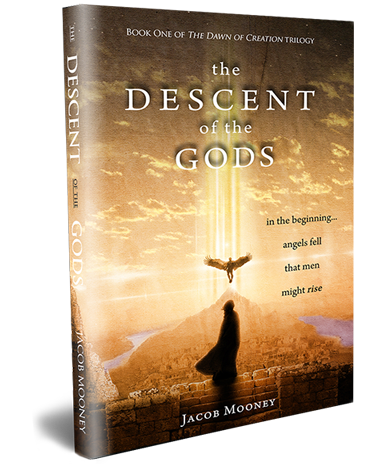Why the Nephilim Matter More Than You Might Think
If you’ve just started diving into the ancient mystery of the Nephilim, Genesis 6:1–4, and related writings like the Book of Enoch, you’re not alone. Questions, debates, and interpretations have swirled around these four verses for thousands of years.
Yet behind all the noise, the story hints at something profound: a real cosmic rebellion that impacted the very structure of the world before the flood — and still echoes today.
Research Disclosure
This article draws upon:
- Comparative study of the Masoretic Text, Dead Sea Scrolls, and Septuagint renderings of Genesis 6
- Insights from early Jewish literature (e.g., 1 Enoch, Jubilees)
- Scholarly opinions from sources like Dr. Michael Heiser (Reversing Hermon), Irenaeus, and modern conservative theologians.
How Should Genesis 6:1-4 Be Understood?
Interpretation depends heavily on worldview:
- Literal-Historical View: Genesis 6 describes a real event of angelic-human interaction.
- Mythological-Symbolic View: Genesis 6 is seen as symbolic or exaggerated, not literal.
At Chasing the Giants, we follow the literal view, consistent with ancient Jewish and Christian tradition.
Who Were the “Sons of God”?
Several major interpretations exist:
- Fallen Angels (Original View): Supported by early Jewish texts (e.g., 1 Enoch) and theologians like Justin Martyr.
- Demons Possessing Men (Modern Adjustment): Attempts to explain Genesis 6 without angelic embodiment.
- Sethite Men (Later View): Popularized by Augustine (c. 400 AD).
- Leaders/Judges (Minor Ancient View): Some speculate “sons of God” referred to tyrannical kings.
- Aliens (Modern Fringe View): Ancient astronaut theories without biblical foundation.
According to Dr. Michael Heiser, “The sons of God in Genesis 6 were divine beings. The term bene elohim always refers to members of the heavenly host.”
Who Were the Nephilim?
The term Nephilim likely derives from the Hebrew “npl,” meaning “fallen ones” or “giants.”
- Hybrid Offspring: Literal offspring of angels and humans, creating giants (Genesis 6, Numbers 13:33).
- Early Heroes: Mighty humans, according to later theological reinterpretations.
- Mythological Echoes: Some suggest later cultures mythologized distant memories of the Nephilim.
Why Did This Happen?
Multiple reasons converge:
- Corrupting the Seed: Infiltrating human bloodlines to sabotage the promised Messiah (Genesis 3:15).
- Grave Angelic Rebellion: Disobedient angels faced imprisonment (Jude 6; 2 Peter 2:4).
- Human Rebellion: Humanity’s cooperation with divine rebellion exacerbated wickedness.
Was This the Real Cause of the Flood?
- Indirect Cause: The flood targeted overwhelming human wickedness, to which the Nephilim contributed.
- Genesis 6:5: “The LORD saw that the wickedness of man was great in the earth.”
The Nephilim didn’t cause the flood alone but accelerated the violence and corruption that necessitated divine judgment.
Unhelpful Preconceptions to Watch Out For
- “One-Third of Angels Fell”: A later interpretation based on Revelation 12. Early traditions suggest a slower, progressive rebellion.
- “Angels Can’t Have Sex”: Jesus said angels in heaven don’t marry. Fallen angels abandoned their rightful domain (Jude 6).
- “Good Angels Would Never Fall”: Satan himself fell from goodness (Ezekiel 28:15).
- “This Is Fringe Stuff”: Early Jewish and Christian thought saw this as mainstream theology, not fringe speculation.
Unique Insight: Cultural Echoes in Global Myths
Ancient myths about gods mating with humans — from Greek Titans to Mesopotamian heroes — may reflect distant, distorted memories of the Genesis 6 rebellion.
Speculative Thought: Could the story of Hercules, a demigod born of a god and a mortal, trace back to the ancient memory of Nephilim?
Examining Ancient Translations: Dead Sea Scrolls vs. Masoretic Text
The Dead Sea Scrolls’ copies of Genesis (like 4QGen-Exod) preserve a form of the Genesis 6 account closely aligned with the Masoretic Text but reinforce supernatural interpretations seen in 1 Enoch.
- Masoretic Text: Focused, terse description.
- Dead Sea Scrolls Context: Coexists with expansive supernatural narratives (e.g., 1 Enoch’s Watchers).
This harmony strengthens the case that ancient Jewish communities understood Genesis 6 supernaturally, not symbolically.
Quick Q&A: Fast Facts You Should Know
History of Interpretation:
- Early Jews (e.g., authors of 1 Enoch) and Christians (e.g., Tertullian) viewed Genesis 6 as literal angelic rebellion.
Later Rejection:
- Augustine’s reinterpretation shifted Christian thought toward human-only explanations.
Modern Renewal:
- Discoveries like the Dead Sea Scrolls confirm the widespread ancient belief in angelic-human unions.
Cross-Cultural Echoes:
- Global myths suggest distorted memories of a real primeval rebellion.
Source Awareness:
- Books like 1 Enoch provide context but are not canon; Scripture remains supreme.
Why This Debate Still Matters
The Genesis 6 story isn’t just about ancient giants. It’s about the unseen rebellion that underlies the brokenness of our world — and points us to God’s ultimate plan of redemption through Christ.
Rather than brushing aside the Nephilim story, we should explore it with humility, careful study, and an eagerness to honor the full testimony of Scripture.
Keep asking. Keep seeking. And above all, stay rooted in the truth.




